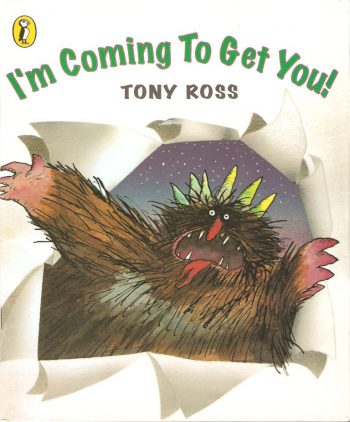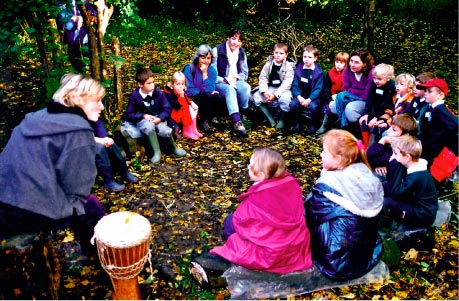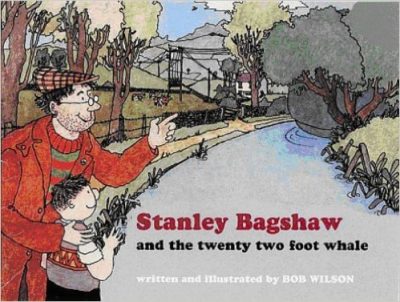Do you read to your class….do you read to your class every day or do you read to your class at all?
Its an interesting question, especially now that the current Primary curriculum pressurises and prescripts learning times and teaching content to such a degree. So is it now possible to introduce such a feature into our class learning programme?
If you have ever had to do a time audit of your teaching you will find out just how revealing it can be. In pushing for a balanced and timed curriculum we are told to count all the time slippages we can identify and tighten up on teaching times.
Take this example (it is true) – a teacher decides that 10 minutes before the end of the school day she will send her class to collect their coats and bags and bring them back into the classroom ready to leave. Has she in fact shortened her day and also the teaching time for the class? Well 10 minutes doesn’t seem long but lets see how that accumulates over a term.
10 minutes a day for 5 days equals 50 minutes a week – multiply that by the number of weeks in a term and the class is spending 12.5 hours collecting coats in the Autumn term alone! – which is probably the equivalent of the teaching time allowed for lets say music!
My point is this – in a pressurised curriculum can we justify spending 15 minutes a day in reading to the class?

Reading to your class is a very special opportunity and to be honest a privilege to share with your class. It is a time when the children can simply relax and listen as the story unfolds. But why is this such a special time and why is it so effective?
As teachers I am sure we realise the importance of reading to our children at home. Again this is a special shared time, most probably when the children are in bed and just before they settle down. I did this with my boys and in the half light we shared some great stories and adventures together. There were no screens, no TV, no computer or tablet just the 2 of us and the book.
Together we solved mysteries, fought bullies, built soapbox carts and messed about with friends – in reading about these and other adventures we became part of the action, part of the gang and part of the adventure. We loved it !
However, parents may not be representative in our approach. We would hope that the same happens at home, but does it? Parents and children both seem to share an ever increasing whirl that occupies the times after work and school. Children are more often than not taken from club to club from activity to activity….ballet, football, athletics, cubs, brownies and many more. It is hard enough to find the time for homework let alone time to spend together!

But perhaps this unceasing whirl is the very reason we SHOULD be giving time to spend with our children. It is a quiet time to step back from the racing around and its a time to share the closeness that we hope to have in family life. It cements the bonds of families, the trust and security given by parents and also is a chance for children to express personal happiness, fears or doubts.
Whilst I am giving good reasons for Parents reading to children, I can say that many of these positive features are apparent when we as teachers read to the class.
It is a quiet time when we can step back from the hustle and bustle of the learning day, we can share together the adventures that we hear about in the books we read and identify with the characters we meet and follow. The stories can take us out of our own lives and into new and fantastic world and places and our imaginations can run wild – we share this together…teacher and class / children and children. It forms a special bond.
Of course if we were to look at this simply from an educational point of view (and please don’t) we can refer to such learning skills as
- Listening skills
- Creative imagination development skills
- Learning to develop critical and analytical thinking
- Developing opinions
- Story and character understanding
- Language development
The list could go on and on…..
I have never been in a class where the class did not enjoy these reading times – never !
The practicalities of reading
- Just like every other thing you do in class and in your teaching you have to get things organised. The first thing is to choose a time to read. In my opinion and experience you need to find 15 minutes every day that you can use at the same time every day. The children will get to know this time and look forward to it. So don’t just try to cram it in anywhere – schedule it into your timetable. If you can fit this in at the end of the day then that’s an ideal time – however your school timetable may prevent this from happening. Assemblies seem to be the things that stop this as many schools now have assemblies at the end of the day. If this is the case try and look at the last 15 minutes before lunch – every day.
- Your next task is to choose a book – choose something that’s obviously suitable for your class in age and also subject. Don’t forget that your book needs to be equally appropriate for boys and girls. For Reception and year 1 you will be looking for books that have a large picture base which can help the children imagine and follow the story, but from year 2 the children can be introduced to more text based stories – you be the judge as you know your class abilities and needs
- How to read….in writing that it sounds a stupid comment to make, however how you read makes a difference. One of the great things about reading to your class is that it is an activity that you share together. So you as the teacher have to convey your excitement and enjoyment for this book to the children. I have seen many great books mechanically read to classes which effectively killed the book and resulted in nothing being gained from the experience. You have to make it an occasion….I always forgot where we got up to: I always needed to have a quick verbal recap to remind myself where we were and I used to stop occasionally to comment on what had happened.
- Always finish at an exciting part – I used to keep an eye on the clock and then try to time an exciting bit to finish on….much to the annoyance of the class!

Extra things to consider or think about
- Where the children are sitting – older children Y2 and above, I would suggest stay at their desks while Y1 and Rec would be seated on the carpet.
- Fidgets! If you ask children to sit and listen for 15 minutes and keep still then they will fidget…if you let them draw on scrap paper then they will listen at the same time without distracting others or fidgeting.
- Make sure that the book you choose is of decent length so that the children get to know the characters, become immersed in the world and enjoy the adventures. If your choice simply bounces in and out of a story then many of the learning skills we listed previously are lost.
Recommended books
I am going to mention only a couple of books here that have been successful in my classes – you will, of course have your own favourites or will enjoy searching out others.
Both choices are Y3/Y4
- Secret seven series – the language has not dated and the children are about Y3/Y4 age. Involves both boys and girls. It has good mysteries which the children enjoy.
- Magic Faraway tree – big lengthy publication (all books published in 1 )…can last a full term. The children love the magical world and characters and enjoy the magic land that appear at the top of the tree. My class did a lot of spin off work from this book.
In both cases children went out and bought their own copies of the books to read and follow at home.
So there we are – my case for reading to your class! If you do currently read to your class then I expect you can empathise with the sentiments I have written here.
If you don’t then perhaps give it another thought – you might be surprised at how popular it becomes!

Primary Practice would like to invite you to join our NQT and trainee teachers Facebook group https://www.facebook.com/groups/1347401775298840/?ref=bookmarks



I think it’s really important to read to our kids. For some children, you may be the only adult role-model whom they see reading. If we want children to know that we value reading we need to let them see that we are prepared to spend some of our time actually reading and that it is a skill which is it’s own reward! We spend so much time teaching children the skills and techniques of reading but if we don’t motivate them to WANT to read, can we really say that we have succeeded?
I think you have summed it up very well Aine. Reading is a core skill and foundation for so much. However in addition the joy of reading and encouraging that in children lasts a lifetime.